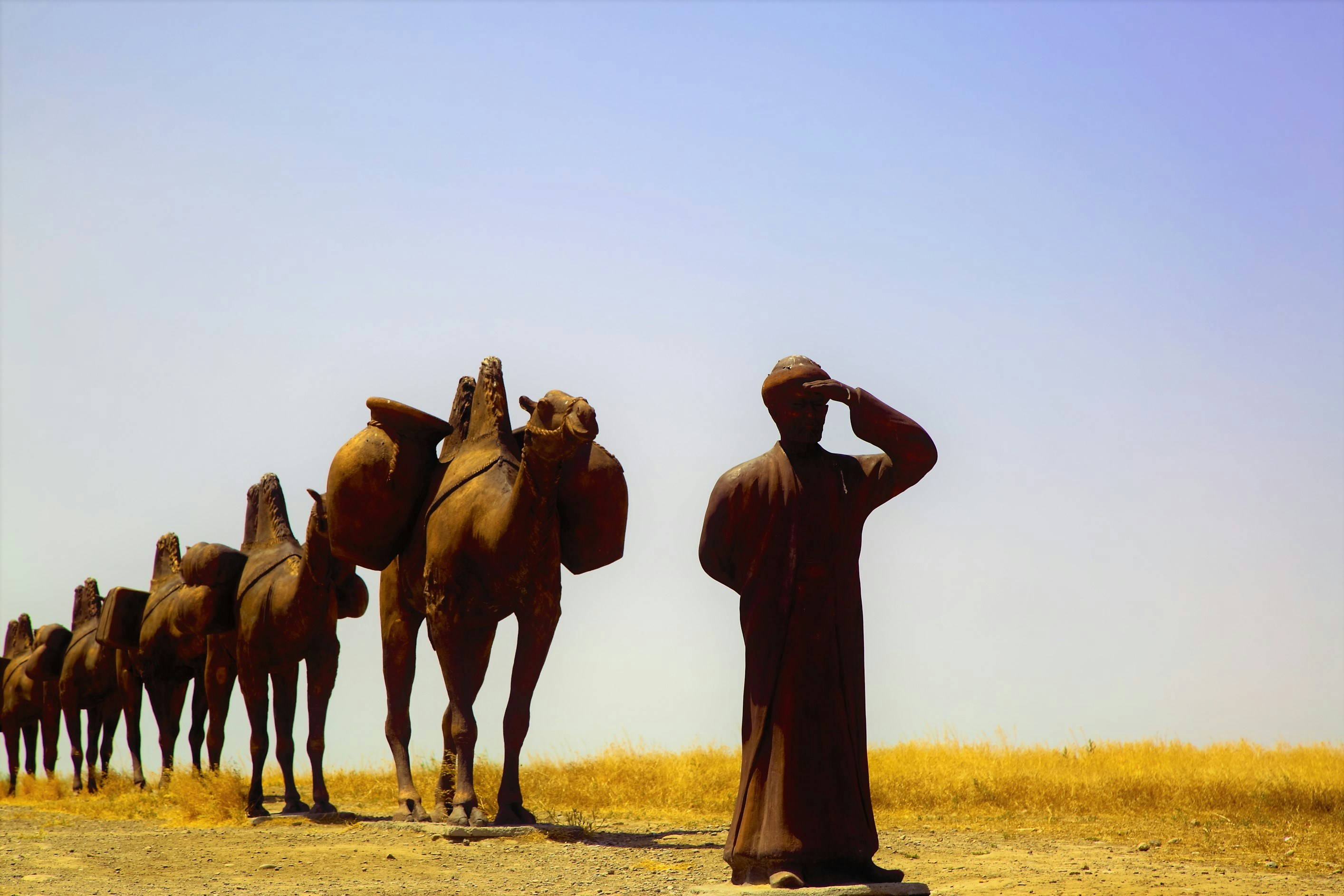
Statue of man and camels from Türkistan, Kazakistan.
“Knowledge of the language is necessary,” Interior Ministry spokesman Shyngys Alekeshev told reporters, adding that the new amendments were similar to those in countries like Germany, Canada and Turkey.”
Summary: Kazakhstan imposes stricter language requirements for naturalized citizens to reduce the role of Russia in Kazakhstani society.
Kazakhstan has made it stricter for noncitizens to become naturalized citizens by requiring applicants to pass a series of history and language tests. According to the excerpted article from state-run news outlet Kazinform, “ignorance of the state language… as well as the basics of the history and Constitution… can become grounds for refusal to admit citizenship.” The move is part of a broader push by the government to promote and preserve the Kazakh language and possibly distance itself from Russian influence. The move comes amid remarks made by Russian commentators and academics who have called into question the legitimacy and sovereignty of Kazakhstan as a country. It may be interpreted as a move to reduce the role of the Russian language in schools, business, and other aspects of Kazakhstani life. In January, a Russian historian, Mikhail Smolin, claimed on Russia’s state-owned television that Uzbekistan and Kazakhstan did not exist as nations.[i] The charge drew widespread condemnation in the region.
The new language rules, under the leadership of President Kassym-Jomart Tokayev, are just one manifestation of Kazakstan’s pivot away from Russia toward other regional powers like China. Part of the Soviet legacy, particularly along its northern border with Russia, large portions of Kazakhstan’s population do not speak Kazakh. There are proposals underway to regulate the country’s media to require that a majority (55 percent) of all content on radio and television be broadcast in Kazakh by 2025. The widely heard phrase “Qazaqsha soyle” (Speak Kazakh) is now commonly heard on the street and has even emerged as an internet meme.
Tokayev has defined his “multi-vector” foreign policy as one of pragmatism defined by “national interests and strategic tasks.”[ii] Russian soft power and influence is arguably on the wane in Kazakhstan, whose youthful population – half of its population is under the age of 30 – did not grow up under the Soviet Union and have absorbed the “de-colonization” discourse ascendant among other countries in the Global South.[iii]
Sources:
“Ignorance of the state language at the elementary level can prevent admission to citizenship of the Republic of Kazakhstan – Ministry of Internal Affairs,” (Незнание госязыка на элементарном уровне может помешать в приеме в гражданство РК- МВД),” Kazinform (Kazakhstani state news agency) 20 May, 2024. https://www.inform.kz/ru/neznanie-gosyazika-na-elementarnom-urovne-mozhet-pomeshat-v-prieme-v-grazhdanstvo-rk-mvd-0aabd6
“Ignorance of the state language at the elementary level, as well as the basics of the history and Constitution of our country can become grounds for refusal to admit citizenship. The elementary level will be determined by the Ministry of Science and Higher Education. The purpose of the amendments is rapid adaptation and integration into society. Knowledge of the language is first of all necessary for the citizens themselves who want to obtain our citizenship in order to quickly join society and participate in the life of the state,” said Shyngys Alekeshev at a briefing in the Ministry of Internal Affairs.
“To prevent dual citizenship, a new basis for registering the loss of citizenship of the Republic of Kazakhstan is being introduced. Citizenship of our country will be lost if the passports of another state are used after acquiring citizenship of Kazakhstan. Previously, it was planned to lose citizenship of the Republic of Kazakhstan only for the acquisition of citizenship of a foreign state,” added Shyngys Alekeshev.
Notes:
[i] “Russian historian Mikhail Smolin: ‘Uzbekistan did not exist at all before the revolution’,” Anhor.uz (online Uzbek newspaper), 23 January 2024. https://anhor.uz/news/there-were-no-uzbeks/
[ii] “President Tokayev: Kazakhstan Continues Constructive, Balanced Foreign Policy Considering National Interests,” The Astana Times (English-language weekly), 3 January 2024.
[iii] In May 2022, months after Russia’s invasion of Ukraine, not a single leader of Central Asia commemorated Victory Day in Moscow—a symbolic blow to the Kremlin and a demonstration of the region’s growing autonomy. See: Temur Umarov, “Kazakhstan is Breaking out of Russia’s Grip,” Foreign Policy, 22 September 2022. https://foreignpolicy.com/2022/09/16/kazakhstan-russia-ukraine-war/
Image Information:
Image: Statue of man and camels from Türkistan, Kazakistan
Source: Ekrem Osmanoglu, Unsplash, https://unsplash.c om/photos/statue-of-man-and-camels-during-daytime-2qbAZ7RGPNM
Attribution: Free to use under the Unsplash License
